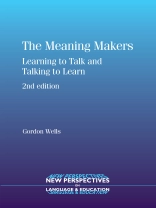The Meaning Makers is about children’s language and literacy development at home and at school. Based on the Bristol Study, “Language at Home and at School, ” which the author directed, it follows the development of a representative sample of children from their first words to the end of their primary schooling. It contains many examples of their experience of language in use, both spoken and written, recorded in naturally occurring settings in their homes and classrooms, and shows the active role that children play in their own development as they both make sense of the world around them and master the linguistic means for communicating about it. Additionally, this second edition also sets the findings of the original study in the context of recent research in the sociocultural tradition inspired by Vygotsky’s work and includes examples of effective teaching drawn from the author’s recent collaborative research with teachers.
Mục lục
Acknowledgements
Prologue
Introduction
Notes on Transcription of Dialogue
Extracts
Chapter One The Children and Their Families
Chapter Two Learning to Talk: The Pattern of Development
Chapter Three Learning to Talk: The Construction of Language
Chapter Four Talking to Learn
Chapter Five From Home to School
Chapter Six Helping Children to Make Knowledge Their Own
Chapter Seven Differences between Children in Language and Learning
Chapter Eight The Centrality of Literacy
Chapter Nine The Children’s Achievement at Age 10
Chapter Ten The Sense of Story
Chapter Eleven A Functional Theory of Language Development
Chapter Twelve Towards Dialogue in the Classroom
Chapter Thirteen The Interdependence of Practice and Theory
Epilogue
References
Giới thiệu về tác giả
Dr. Gordon Wells is currently Professor of Education at the University of California, Santa Cruz, where he researches and teaches in the fields of: language, literacy, and learning; the analysis of classroom interaction; and sociocultural theory. As an educator, his particular interest is in fostering dialogic inquiry as an approach to learning and teaching at all levels, based on the work of Vygotsky and other sociocultural theorists. The rationale for this approach together with examples of it in practice are presented in Dialogic inquiry: Towards a Sociocultural Practice and Theory of Education (Cambridge University Press, 1999). From 1969 to 1984, he was the Director of the Bristol Study of Language Development at Home and at School, and from 1984 to 2000, he was a professor at the Ontario Institute for Studies in Education of the University of Toronto, where he was involved in several collaborative action research projects with educational practitioners in Canada. Chief among these was a project entitled âDeveloping Inquiring Communities in Educationâ (DICEP), which was funded by the Spencer Foundation. Books arising from this work are Constructing Knowledge Together (Heinemann, 1992), Changing Schools from Within (OISE Press and Heinemann, 1994), and Action, Talk and Text: Learning and Teaching through Inquiry, written with his DICEP teacher colleagues, (Teachers College Press, 2001). He is also co-editor of Learning for Life in the 21st Century: Sociocultural Perspectives on the Future of Education (Blackwell, 2002).












